Hiring for potential vs. hiring experienced candidates is similar to a gardener deciding whether their garden needs a mature tree or a sapling 🌱. To create a balanced workforce, or a beautiful garden, you actually need both.
Either way, many factors could sway the pendulum on this debate, such as the size of the company, current team goals, current employees, and the complexity of the role. But in the end, both hiring approaches help an organization grow and succeed in different ways.
So, let’s delve into when each approach is a good idea.
TL;DR – Key Takeaways
Hiring for potential is a hiring approach that focuses on a candidate’s potential rather than their work experience. It can open the talent pool to more diverse, curious, and passionate new hires.
Along with adding enthusiasm and fresh ideas to the mix, the other benefits of hiring for potential include long-term sustainability and growth and beefing up the organization’s agility.
To decide which approach you need, factors like the size and stage of a company and the nitty-gritty of the job may affect your decision.
How do you assess potential? Skills assessments that include soft skills can help you get a better picture of who a candidate is and whether they align with the role, team, and company culture.
The downside of hiring for potential touches on aspects like the intensive training and feedback this new hire may need. On the other side, an experienced hire often makes smarter decisions and becomes productive a lot faster.
To reach a balance between both approaches, you can follow a few simple steps starting with job task analysis and conducting a skills assessment before making any kind of job offer.
Whether you’re looking for a sapling or a mature tree, Toggl Hire can help you spot the best job candidates through simple, customizable skills assessments.
What does hiring for potential even mean?
Basically, hiring for potential means predominantly focusing the hiring process on a candidate’s potential rather than on their work experience, resume, or proven track record.
When hiring for potential, it means candidates have the desired soft skills — like a positive attitude and eagerness to learn, but limited technical knowledge, skills, and qualifications, for example, not much on-the-job experience or experience in your particular industry.
With this hiring approach, you’re establishing how the person will contribute to the company’s culture in the long term and grow with the right training. Hiring managers typically use this approach when:
Employing candidates shifting from another industry
Hiring parents or people that are returning to work after a hiatus
Filling temporary positions
- Trying to solve skills shortages
The new hire, in this case, is like a sapling — they have lots of room to grow and be shaped in a way that benefits their future and the rest of the organization!
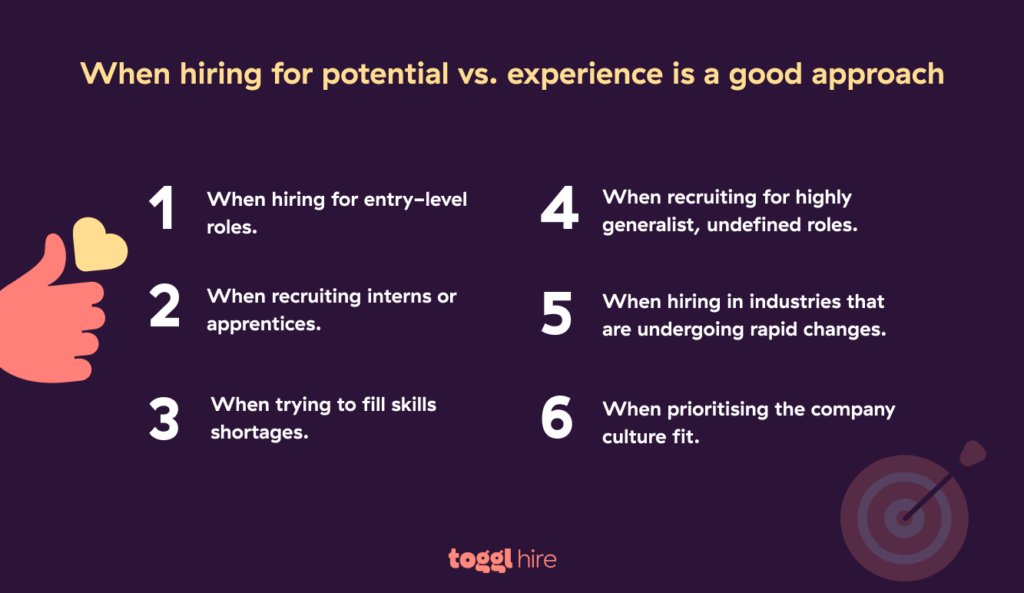
What are the benefits of hiring for potential?
A key benefit in hiring for potential is that you open up the interview process to a broader group of external candidates. For instance, you have a marketing assistant position to fill, and instead of narrowing the job parameters by insisting on two years of experience in a software company, your hiring process is open to more candidates and assessing fresh grads for the role.
If you think about it, we all learn new skills on the job, skills we didn’t have when we were hired. So sometimes it’s about choosing someone who will take the initiative as well as be competent enough to continue learning new skills that’ll make them successful in the role and beyond.
You can assess whether candidates have the right soft skills or technical skills for the specific job, with our pre-built test templates!
Along with the bonus that adding upbeat, enthusiastic employees brings to the team, the impact when you hire for potential can be felt across the company, supporting bigger HR goals like internal mobility, career development, and employee retention rates.
Let’s explore a few of those benefits in more detail.
Broaden your talent pool
Open up your hiring funnel to a broader range of job seekers so the hiring team’s choice isn’t restricted to the ‘perfect candidate’ only.
Hire more diversely
With a broader candidate selection, you’ll have access to more diverse candidates who can add their unique contributions and approach to outdated working methods.
Deliver long-term sustainability and value
Onboarding someone that has a good attitude and is motivated to learn and grow in the company means the candidate and company get longer-term value from their contribution.
Get the right cultural fit
New hires with the right potential will flourish if the company culture matches their values. The added synergy can help them become productive faster and boost employee engagement.
If you want to improve productivity within your company, you need to create a positive culture. It won’t just boost morale and collaboration; it will also empower people to focus on their most important tasks and engage with their work like never before.
Forbes
Enable more agility
Hiring people who think differently and more creatively means they’re more adaptable. So they can switch up what they’re doing and how they’re doing it quickly, leading to more agility and innovation.
Learn more about the core skills new employees need to future-proof your organization, like adaptability and learning and applying new knowledge super fast 👇
Build employee loyalty
By supporting passionate candidates that may not have extensive experience or have shifted to a new industry.
Save money
Their salary expectations will be more cost-effective than someone with lots of experience who’ll likely expect more money.
📚 Read on to learn about the true cost of hiring an employee.
When should hiring managers hire for potential vs. experience?
There are many variables when deciding whether to hire for potential or experience. For one, the job could require direct experience in a particular skill. Think technical SEO specialist. The person needs to hit the ground running and meet critical deliverables. Whereas hiring for an internship job opening will have very different parameters and likely require no prior experience.
If we break it down further, the type of role and growth phase of the organization are key factors that’ll affect your choice.
“Skills are like ingredients in a recipe, while potential is the fire that cooks the meal. To create the perfect dish, you need the right blend of both.”
Unknown
Type of role
If the open position you’re trying to fill requires particular technical skills and experience in the job requirements, such as a chief financial officer or senior backend developer, a specific skill set is necessary for successfully filling that position.
Typically these are more senior roles where the new hire will need to make high-level business decisions that rely on judgment and their subject matter or industry expertise.
For filling open positions in more junior roles or a particular program, such as a graduate program, internship, or assistant role, experience is less important or possibly not necessary at all. The focus of job ads and the hiring process is on the person’s attitude and potential for growth in the company.
A similar approach is possible with generalist roles, like a salesperson. While the candidate could have experience in sales in another industry, they may not have direct experience in your sector. But they have transferable skills, which allow the experience to take a back seat.

Company’s growth phase
A startup will have very different staffing requirements than an established business like Google or IBM. The startup’s hiring decisions will be driven largely by budget. As a result, they may veer away from candidates with extensive experience that’ll have higher salary expectations.
Bigger, more established organizations generally focus on more experienced hires (unless they’re filling open positions that are junior or generalist) so they have the mettle to be resilient.
So, whether new employees are saplings or mature trees, both add value to the company, just in different ways. 🤩
How can companies evaluate a candidate’s potential?
Many employers’ modern hiring practices now include more than a job interview alone, using different forms of testing to assess whether the potential candidate is a suitable fit. Or, for recruiters, whether the applicant will suit your client.
And, while soft skills like attitude and aptitude may seem like tricky things to test, many HR support tools, like skills assessment platforms have proven to be highly effective for spotting the real talent quickly and easily.
Dynamic, user-friendly solutions, like Toggl Hire, help you make smarter decisions using tools such as:
Skills assessments — automated role-based assessments of candidates’ technical and soft skills, including personality tests.
Interviews — including video interviews, and structured or unstructured interviews.
Homework assignments — providing in-depth insight into a candidate’s specific skills like writing or coding.
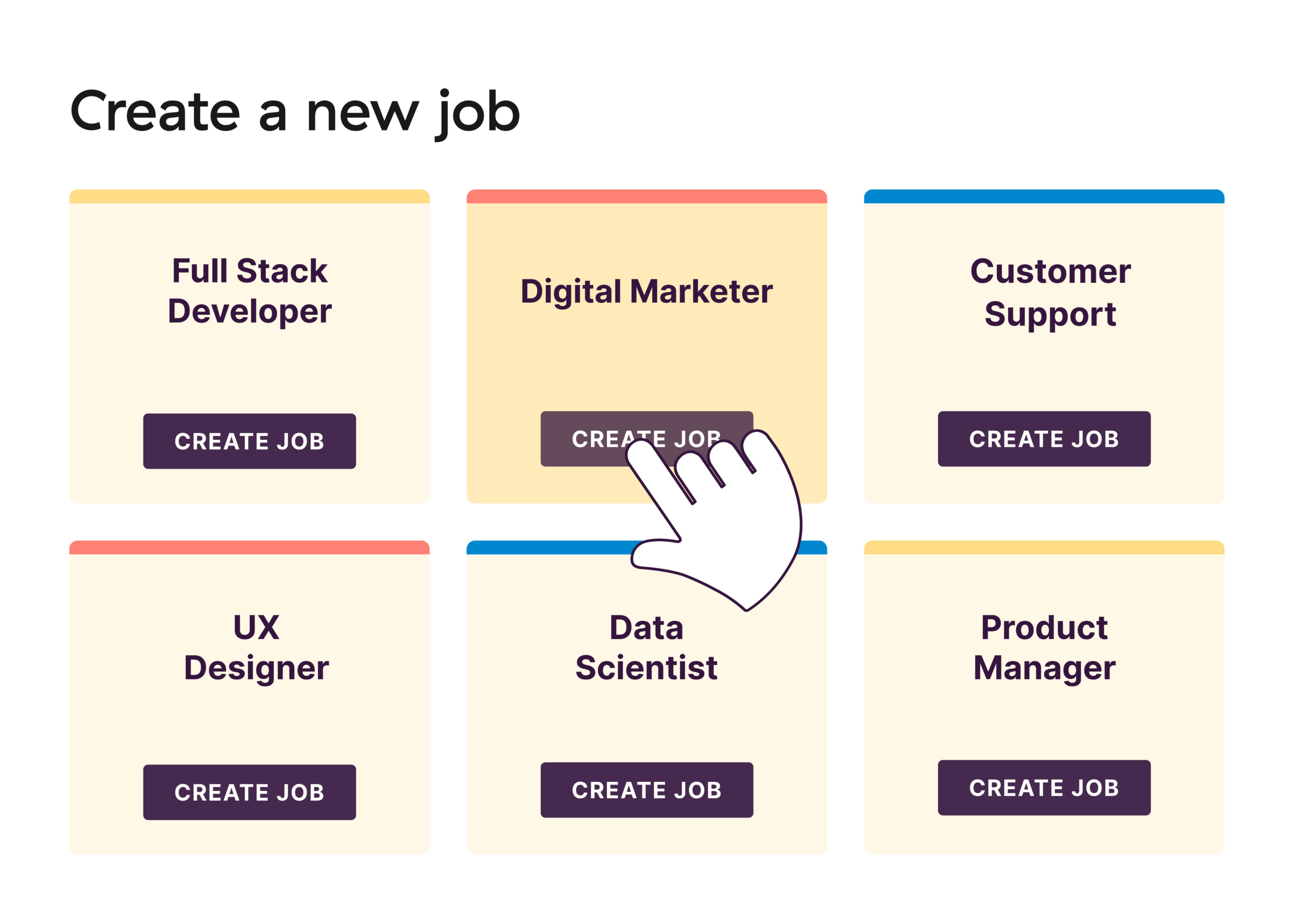
Is ‘hiring for potential’ the better route to a good hire?
Employing candidates based on potential has its benefits for sure, in the right role.
But think about it — would you be happy that the latest upgrade to your mobile banking app’s security was developed by an intern hired for their potential? Sometimes, there’s just no substitute for competence.
Here’s another example.
Say you have a candidate who has firsthand experience with B2B content marketing components and all the issues and challenges that come with the job. If they switch from one software company to another, even in a different field — it won’t take much time or effort for them to start producing quality content. Not only do they know what they need to do, but they also know how to employ that finesse of communication, confidence, and experience to make smart decisions. Their skills are pretty much plug-and-play.
Other disadvantages of hiring candidates with less experience include:
Uncertainty about how the person will actually perform in the job.
Longer learning runway as they’ll need more than a basic onboarding process. They’ll require training, mentoring, and regular feedback.
Dissatisfaction with the role, as they may not have understood what the day-to-day duties would be like.
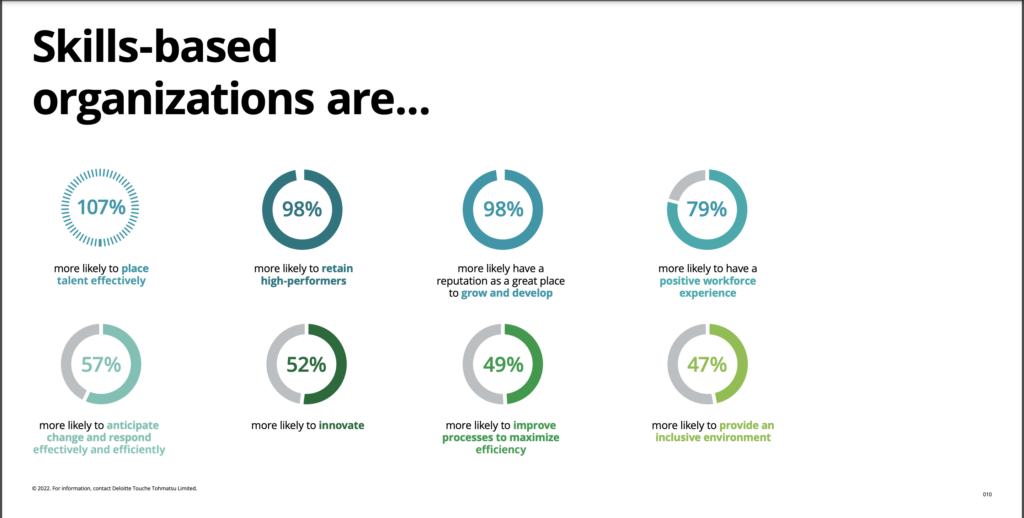
What are the benefits of seeking out an experienced hire?
While the best candidates with the required experience may demand higher pay, the business still has advantages in getting them on board.
Smarter, more confident decision-making
Fewer mistakes as they know the ropes already
Take the burden off overladen team members so they can spend time focusing on their core duties
Quickly establishing trust and buy-in from the team and key stakeholders, as they quickly start delivering work
Gain a competitive edge as the candidate knows their domain and can suggest smarter ways to work that boost your innovation
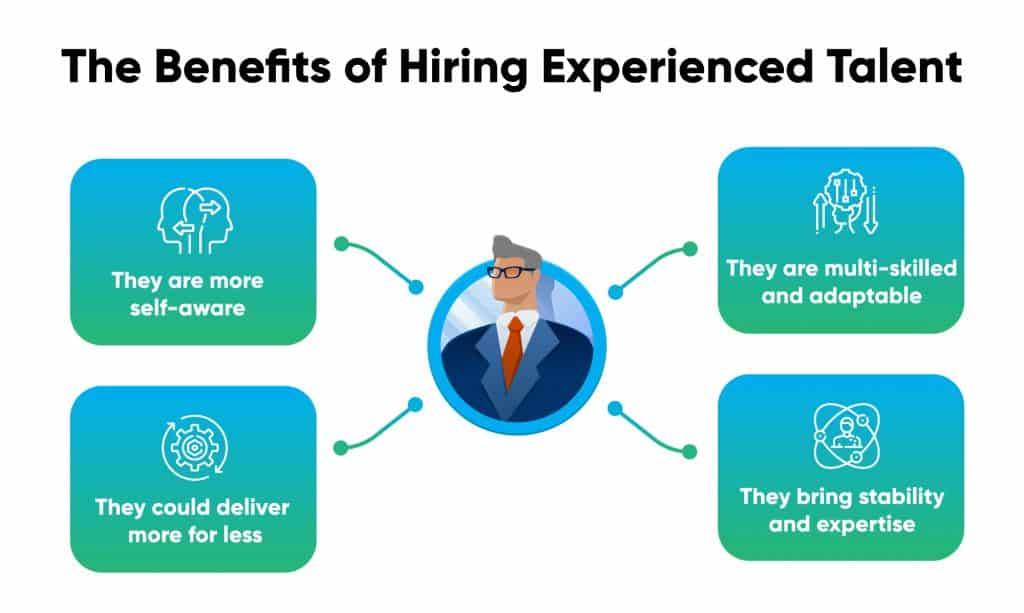
How can you design your hiring process to balance experience and potential?
Perhaps the best way human resources or recruiters can balance the experience and potential of the ideal candidate is to hire based on these four steps.
Perform job task analysis to discover exactly what responsibilities and tasks the job will include.
Next, evaluate the level of experience the particular job will require. What is really needed for a person to be successful? Do they need to hit the ground running, or is there scope for support and training?
Based on your findings, you can set up and utilize skills, aptitude, and other pre-employment skills testing to narrow down the candidate pool.
Once you’ve got your shortlist, you can conduct interviews. Asking personality questions can help draw out what they’re like as a person rather than their professional persona.
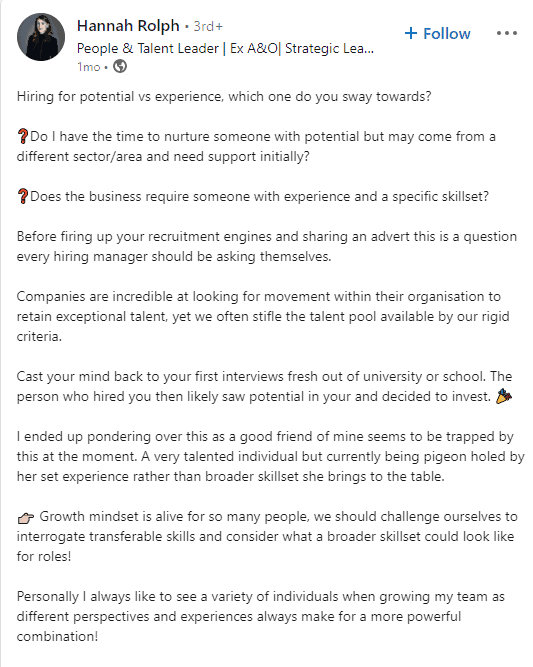
Has hiring for experience become outdated?
Some jobs require specialized experience and skill (typically more senior or technical jobs), and others are more suited to candidates with fresh ideas, passion, and curiosity (and perhaps little to no experience).
The notion of experience being outdated is based on the fact that employees no longer need to follow traditional paths to gain knowledge and skills, such as spending five years or more at university. Online courses, and other modern ways of learning, open access to task-specific or granular learning that someone can use to quickly upskill themselves for a whole new job role or new task they’ll be responsible for.
While hiring experienced candidates is not without its flaws, such as the risk of lack of motivation, career stagnation, or them potentially entertaining multiple offers, most companies can still pick out the right hire for the right job. Using skills assessments, hiring managers can gain insight into the new hire’s capabilities and long-term potential beyond the info shared on their CV.
Ultimately, the workforce needs to be fit for growth, collaboration, and innovation if companies want to keep a step ahead. And what’s even more foundational than an employee’s experience or potential is meta skills.
With meta skills, such as creativity, resilience, and an ability to learn and apply new skills quickly (including your chief executives!), your organization will be ready for whatever the future may hold (queue Terminator music 😂).
Juste loves investigating through writing. A copywriter by trade, she spent the last ten years in startups, telling stories and building marketing teams. She works at Toggl Hire and writes about how businesses can recruit really great people.



